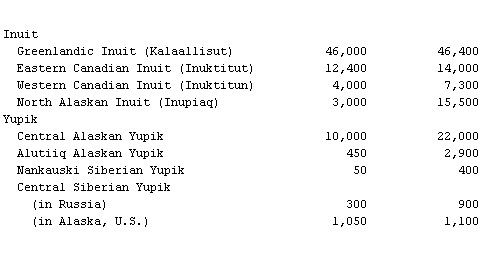Eskimo-Aleut languages, Table
- Eskimo-Aleut languages, Table
-
language fluent population*
speakers*
Inuit
Greenlandic Inuit (Kalaallisut) 46,000 46,400
Eastern Canadian Inuit (
Inuktitut)
12,
400 14,
000
Western Canadian Inuit (Inuktitun) 4,000 7,300
North Alaskan Inuit (
Inupiaq)
3,
000 15,
500
Yupik
Central Alaskan Yupik 10,000 22,000
Alutiiq Alaskan Yupik 450 2,900
Nankauski Siberian Yupik 50 400
Central Siberian Yupik
Eastern Aleut 110 1,530
Atkan Aleut 45 75
Russian Aleut 10 300
*Statistics gathered 1990-95. Figures do not include residents of
urban centres—
 e.g., about 5
e.g., about 5,
000 Greenlanders in Copenhagen,
Denmark.
* * *
Universalium.
2010.
Look at other dictionaries:
Eskimo-Aleut languages — Family of languages spoken in Greenland, Canada, Alaska, U.S., and eastern Siberia by the Eskimo and Aleut peoples. Aleut, distantly related to the Eskimo languages, consists of eastern and western dialects; today both are spoken by fewer than… … Universalium
Languages of Canada — Languages of Canada[1] Official language(s) English (58%) and French (22%) Indigenous language(s) Abenaki, A … Wikipedia
Aleut — Infobox Ethnic group group = Aleut Traditional Aleut dress pop = 17,000 to 18,000 region1 = flagcountry|United States pop1 = 17,000 [including 5,000 part AleutFact|date=February 2007] ref1 = region2 = flagcountry|Russia pop2 = 700 ref2 =… … Wikipedia
Nostratic languages — Nostratic (controversial) Geographic distribution: Europe, Asia except for the southeast, North and Northeast Africa, the Arctic Linguistic classification: Borean (?) … Wikipedia
Sireniki Eskimo language — Sirenik or Sirenikskiy (also Old Sirenik or Vuteen) is an extinct Eskimo Aleut language. It was spoken in and around the village of Sireniki (Сиреники) in Chukotka Peninsula, Chukotka Autonomous Okrug, Russia. The language shift has been a long… … Wikipedia
List of numbers in various languages — The following tables list the names and symbols for the numbers 0 through 10 in various languages and scripts of the world. Where possible, each language s native writing system is used, along with transliterations in Latin script and other… … Wikipedia
North American Indian languages — Introduction those languages that are indigenous to the United States and subarctic Canada and that are spoken north of the Mexican border. A number of language groups within this area, however, extend as far south as Central America. The… … Universalium
Na-Dene languages — Na Dené Geographic distribution: North America Linguistic classification: Dené–Yeniseian Na Dené Subdivisions: Athabaskan–Eyak Tlingit … Wikipedia
Quechua languages — Quechua Qhichwa Simi, Runa Simi Spoken in Peru, Bolivia, Colombia, Ecuador, Chile and Argentina Region Central Andes Ethnicity … Wikipedia
Indo-European languages — Indo European redirects here. For other uses, see Indo European (disambiguation). See also: List of Indo European languages Indo European Geographic distribution: Before the 16th century, Europe, and South, Central and Southwest Asia; today… … Wikipedia
 e.g., about 5,000 Greenlanders in Copenhagen, Denmark.
e.g., about 5,000 Greenlanders in Copenhagen, Denmark. 

